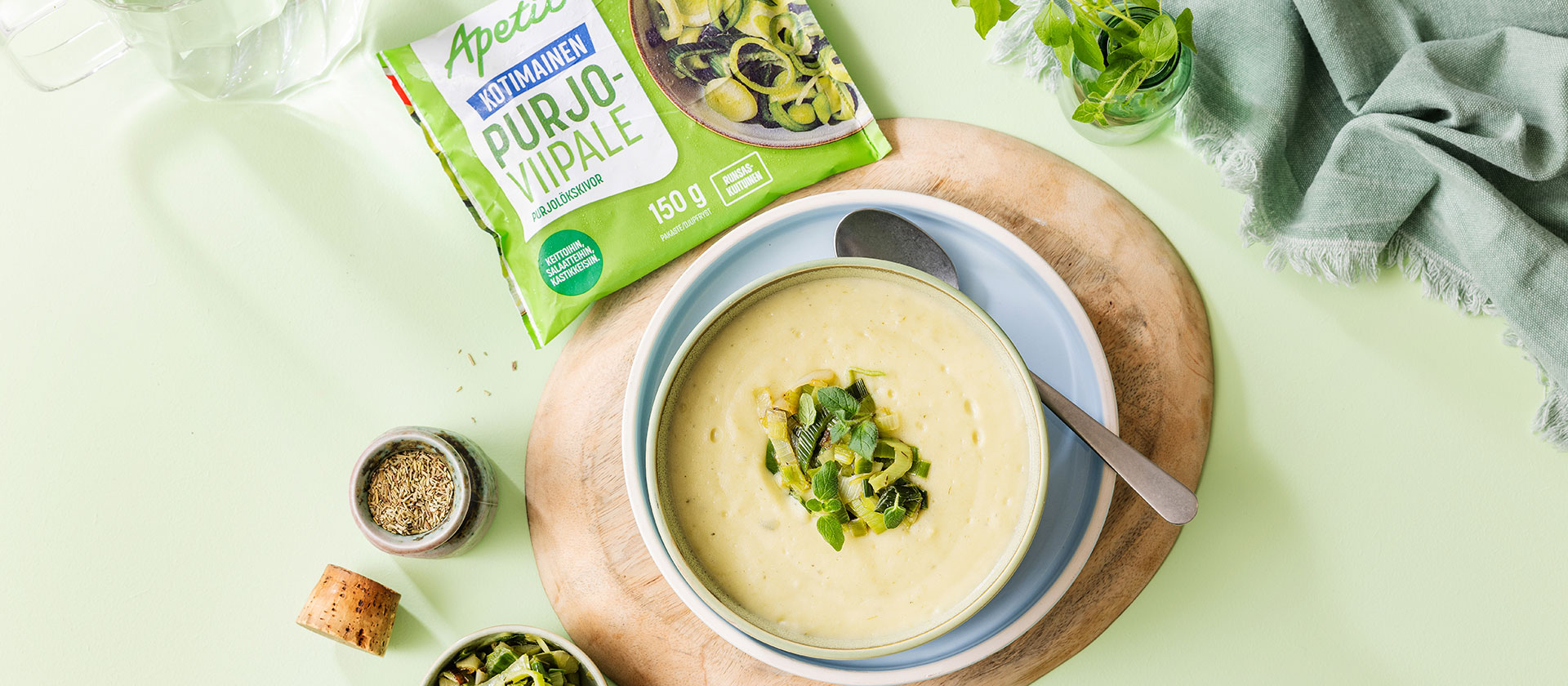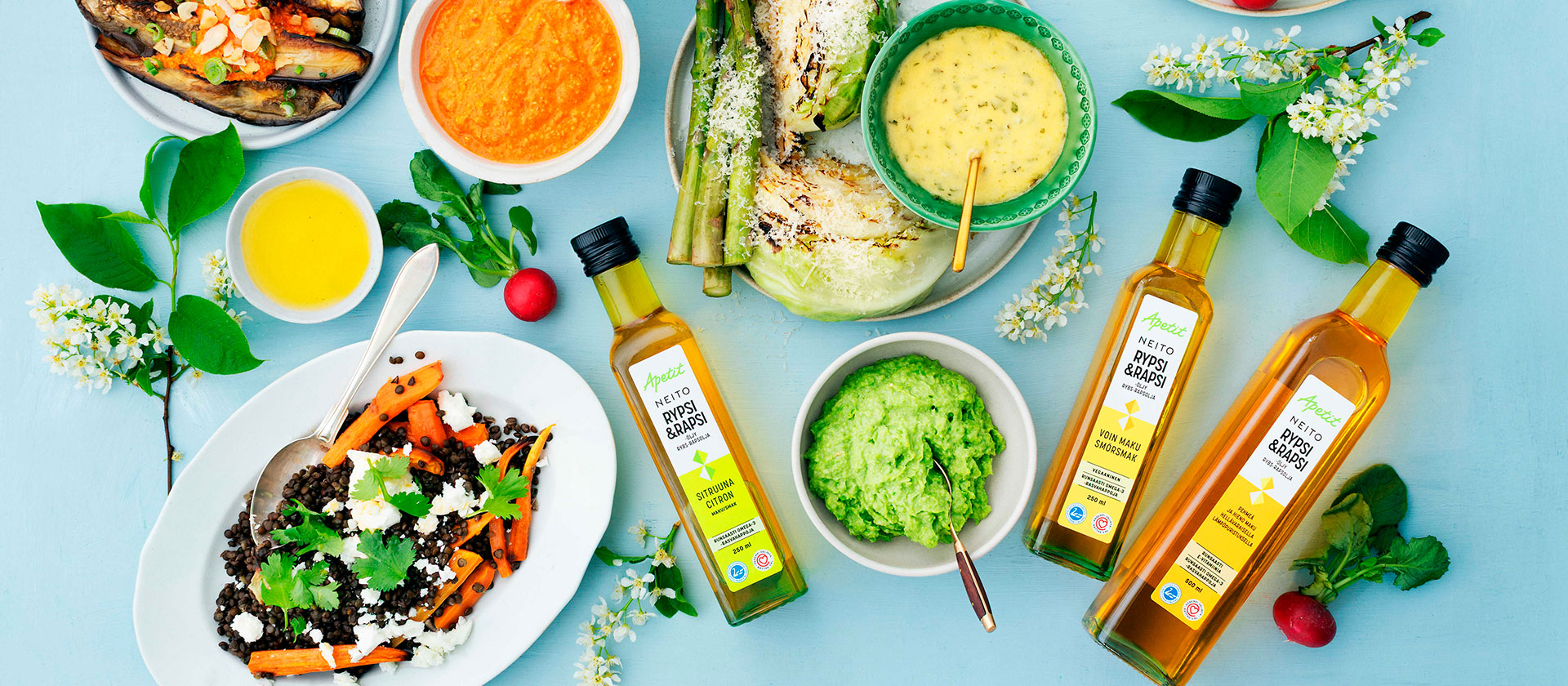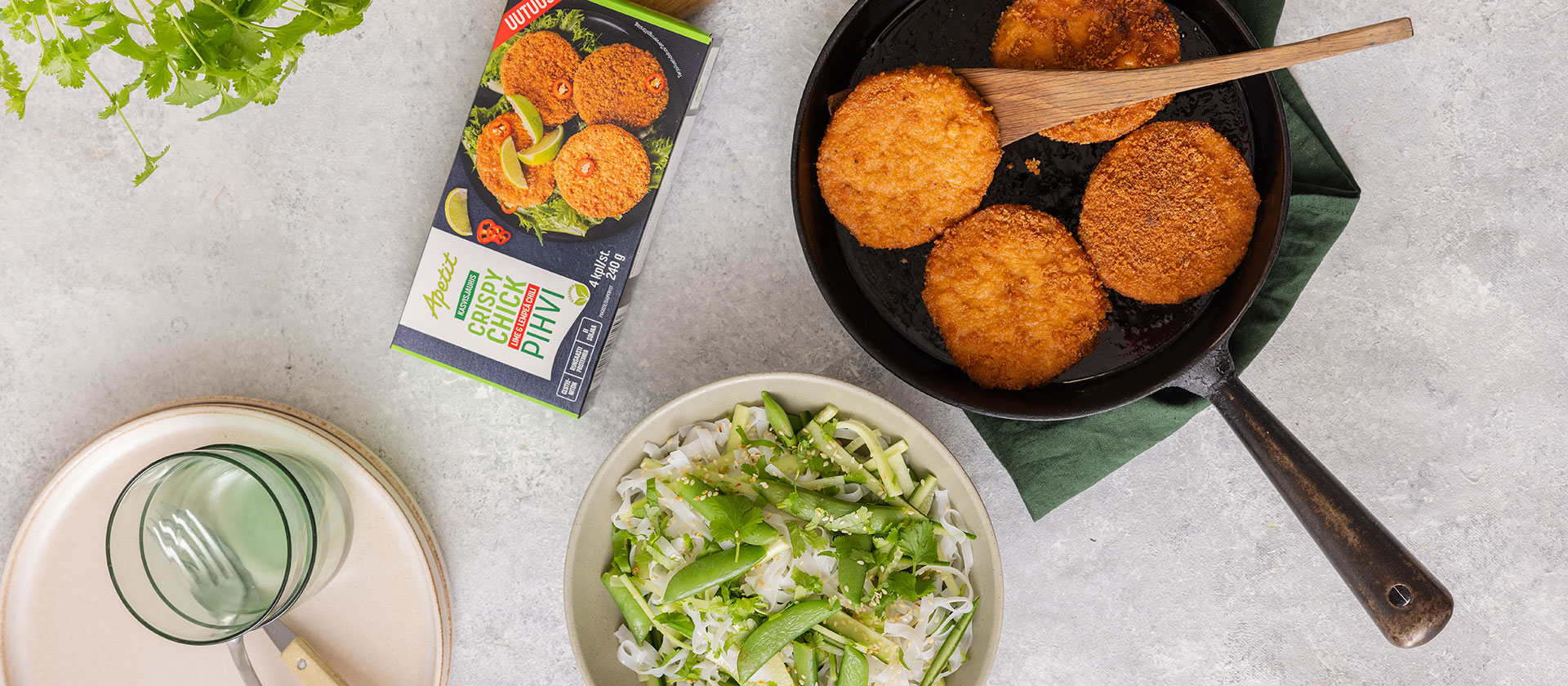CEO’s statement Q3/2020
Esa Mäki, CEO:
“Apetit Group’s positive profit performance continued in the third quarter: all of our businesses improved their profitability year-on-year. We can be satisfied with our profit performance to date. The remainder of the year involves uncertainties related to the COVID-19 pandemic, for example. We keep our profit guidance for 2020 unchanged: the full-year operating profit is expected to improve year-on-year and to show a profit.
The impacts of the COVID-19 pandemic in the third quarter were mainly seen in the Food Service channel of the Food Solutions business, where net sales decreased year-on-year in spite of a partial recovery of sales. Sales grew year-on-year in the other channels of the Food Solutions business. In Oilseed Products and Grain Trade, the impacts of the COVID-19 pandemic were minor. In the challenging operating environment, it has been essential that our employees have stayed healthy and we have been able to maintain normal operations. I want to take this opportunity to express my warmest thanks to all of Apetit’s personnel.
The harvest of outdoor-grown vegetables for this harvest season will be normal. The varying weather conditions in the early summer were challenging, with the cool spring, dry early summer and hot June having a negative impact on the growing season of peas in particular. The difficult growing season meant that we fell short of our target for peas by 1.3 million kilograms. Peas represent a significant share of Apetit’s food exports and, unlike in the previous year, pea exports fell entirely in the third quarter.
One of Apetit’s strategic objectives is to strengthen food exports, particularly to Sweden. Our total food exports doubled year-on-year by the end of September. In the spring, eight products sold under the Apetit brand were added to the product selection of ICA, the largest retail chain in Sweden. Six new Apetit products were subsequently added to ICA’s selection this autumn. Continuing to strengthen our position in Sweden is a clear goal for us. In addition to retail, we are also seeking growth through the Food Service channel through local cooperation.
Natural Resources Institute Finland estimates that the Finnish grain crop this year will be 3.4 million tonnes, which is about 15 per cent lower than last year. The relatively small grain crop will reduce Finland’s export surplus compared to the previous year. The oilseed harvest will be exceptionally low due to the declining area under cultivation and the low expectations of yield per hectare. However, the grain crop and oilseed harvest in the Baltic countries is excellent, which particularly compensates for the exceptionally weak oilseed harvest in Finland. At Apetit, we are continuing our systematic efforts to increase the willingness to cultivate oilseed plants in Finland to increase the area under cultivation and crop yields.
The commissioning of the bioenergy plant under construction next to the Kantvik oil milling plant will be delayed to January–February 2021 due to reasons related to an equipment supplier. The bioenergy plant was originally scheduled to be commissioned at the end of 2020. When completed, the bioenergy plant will significantly reduce the energy costs of the Kantvik oil milling plant and the Group’s carbon dioxide emissions as a whole.
Based on current information, the decision on the novel food marketing authorisation for Apetit’s rapeseed ingredient is expected before the end of the year. This autumn, we decided to invest in small-scale production equipment located on a subcontractor’s premises. Starting small-scale production will enable us to test the rapeseed ingredient more extensively with potential customers. Our work on developing new ingredients has progressed as planned. We are also continuing to assess alternatives related to the commercialisation of the rapeseed ingredient.
We are systematically executing our strategy with the aim of making Apetit a successful Finnish company focusing on plant-based food products.”
Related articles

CEO’s review Q3/2025
Esa Mäki, CEO: "Apetit Group’s operating result for the third quarter fell short of the comparison period. Oilseed Products improved its result slightly, but Food Solutions’ operating result declined from the strong comparison period. In Food Solutions, the deterioration of the result was influenced by the challenging harvest season for frozen peas. Some of the pea fields had to be skipped during the harvesting phase. In accordance with the cultivation agreements, Apetit has compensated the farmers for the pea fields that were not harvested. The operating result of Food Solutions includes EUR -0.4 million of expert expenses related to the acquisition of Foodhills. The delivery reliability situation, which weakened Apetit’s result for the first half of the year, normalised in both businesses in June, after which delivery reliability has remained at a good level. The Group’s net sales increased slightly from the comparison period. On 9 October 2025, Apetit announced that it had signed an agreement to acquire 100 per cent of the share capital of Foodhills. Foodhills is Sweden’s largest contract grower and producer of frozen peas. The completion of the sale is subject to approval by the Swedish ISP authority. The acquisition of Foodhills is a growth project in line with our strategy. We will have a strong foundation in the Swedish market and significantly increase the volume of frozen peas. Apetit has strengthened its position in Sweden in recent years, and now it is time to take a significant step in the company’s internationalisation. The critical phases of the Group’s ERP project with regard to deployment have been completed as planned. In Oilseed Products, the implementation phase took place in early October. The strategically significant project was completed on schedule and within budget. I am proud of the achievements of our committed personnel in the project, which has lasted approximately three years in total. We have launched a strategic investment in Kantvik’s vegetable oil milling plant to improve the raw material production process for BlackGrain from Yellow Fields® rapeseed powder and to multiply its production capacity. The investment has largely progressed as planned and is expected to be completed during the first quarter of 2026. The yield levels of Finnish rapeseed sown in autumn have been excellent in some places. According to the harvest estimate published by Natural Resources Institute Finland on 22 September, the rapeseed harvest would increase by more than 60 per cent from last year and be the highest in eight years. The successful growing season of oilseed plants was also reflected in the variety tests of the RypsiRapsi forum, which saw exceptionally high yield levels for several varieties. The results of the variety tests provide a good basis for further tests and give confidence to Finnish oilseed plant growers, even though the exceptionally good growth conditions of the harvest season should be taken into account in assessing the results. The current year’s harvest outlook for field vegetables is moderate. Of Apetit’s contract farming crops, frozen peas had a challenging harvest season. The hottest period in measurement history and the subsequent regional heavy rainfall taxed crops. The number of field sections skipped in harvesting was higher than usual, which had a negative impact on the result. For root vegetables, the situation looks good halfway into the harvest season. We launched several new products during the autumn. In retail, we introduced a new flavour option to the Apetit Superior frozen pizza product family and expanded the offering to the popular wok product family. We also introduced a Finnish leek slice product, which was very well received in store ranges. We see a growing demand for products that make using vegetables easier and more diverse. Launched in the Food service channel, Apetit Kasvisjauhis Burgerpihvi vegan patty is an interesting new product, as it contains Apetit BlackGrain from Yellow Fields® rapeseed powder. Kasvisjauhis Burgerpihvi is also exceptional in its texture and taste, which is why we look forward to its market reception. The product is an excellent demonstration of BlackGrain’s potential and the innovation and product development expertise of both of Apetit’s businesses."

CEO's review H1/2025
“Apetit Group’s operating result for the first half of the year declined year-on-year due to a weaker result in Oilseed Products. The prolonged collective bargaining negotiations between the Finnish Food and Drink Industries' Federation and the Finnish Food Workers’ Union caused challenges to both of Apetit's businesses during the first two quarters of the year. The overtime and shift change bans during the negotiations affected delivery reliability in both businesses. The strike days related to the negotiations also affected operations in Food Solutions. Food Solutions improved its result in the first half of the year. Both sales volumes and net sales have increased slightly year-on-year. In Oilseed Products, the decline in result was attributable not only to the price of the raw material used, but also to the decrease in sales of refined oil and challenges in delivery reliability. Apetit’s operating result in the second quarter declined from the comparison period. The delivery reliability situation normalised in both businesses in June. Net sales increased in both businesses in the second quarter year-on-year. In Food Solutions, also sales volumes increased. Retail sales developed positively due to the cool early summer being favourable to the sale of frozen products. In July, we announced an investment of approximately EUR 2 million in the Kantvik vegetable oil milling plant. The strategic investment improves the production process of the raw material for the BlackGrain from Yellow Fields® rapeseed powder. The investment in late 2025 will strongly support the commercialisation of BlackGrain. The investment will multiply BlackGrain’s raw material production capacity and significantly improve the quality and efficiency of the process. The total investment includes replacement investments in the milling plant’s current processes. The availability of raw materials has been one of the bottlenecks for increasing actual production. We will continue the practical development of BlackGrain’s various product applications. Thanks to its versatility, BlackGrain is suitable for a wide range of products in the food industry. Customer-oriented product application work is carried out for both BlackGrain rapeseed powder and TVP plant protein made from BlackGrain, which contains pea protein in addition to BlackGrain. At the same time, we are investigating alternatives for producing the BlackGrain rapeseed powder. Apetit is assessing potential partnerships and starting production by making an investment in the Kantvik vegetable oil milling plant or with purchased services. The strategically important ERP project has progressed according to schedule. The new ERP system is scheduled to be implemented in Oilseed Products by the end of the year, after which all Group operations will be covered by the new system. The outlook for the harvest season is currently moderate. In early summer, even the cool weather offered a promising start to the growing season, which benefitted spinach and pea in particular. However, the hottest period in the history of measurements in July weakened the harvest for frozen peas due to the rapid ripening of the harvest. Regional heavy rains taxed frozen pea crops in some places. Frozen peas are harvested on a record-large area of 2,000 hectares. The success of the harvest season is ultimately determined by the weather in the autumn and the harvesting conditions. The growing season of onion, which is Apetit’s contract farming crop for the first time, has largely gone according to expectations. Onion is a significant crop in Apetit’s product range and a strategic addition to the list of contract farming crops. The cultivation areas for Finnish oilseed plants grew strongly from the previous year. The growth season of spring-sown oilseed plants has largely progressed according to expectations and the harvest outlook is at an average level. There are regional differences in weather conditions and pest situation. The weather conditions early in the growing season were favourable for autumn oilseed plants, so oilseed plant fields shone exceptionally yellow in the early summer. The harvest outlook for autumn oilseed plants is good. We will continue to invest in Finnish cultivation development. Several variety trials are underway in the RypsiRapsi forum. Trials are underway in autumn oilseed plants with regard to sowing technology, among other things, and fertiliser and sowing method trials are underway in spring oilseed plants, both on a square and farm scale. The Räpi experimental farm, on the other hand, is running two projects related to different new plant protection methods. Development projects in Finnish cultivation lay down the conditions for the continuum of cultivation of plants significant to Apetit, especially in adapting to the changes brought about by climate change. The new national nutrition recommendations published in late 2024 and the importance of well-being and sustainability in food trends are reflected in the increased consumption of frozen vegetables in Finland. This phenomenon can be seen in frozen peas, for example. The increased popularity of legumes and the ease of using frozen vegetables combined with the uniqueness of Finnish frozen peas have increased the sales of Finnish frozen peas by more than one-third over five years. This the right direction, because adding more vegetables onto the plate is a good choice in every way." Esa Mäki, CEO

CEO's Review Q1/2025
"Apetit Group’s operating result for the first quarter declined from the comparison period. The result of Food Solutions improved, but the operating result of Oilseed Products decreased from the strong result of the comparison period. In Food Solutions, both net sales and sales volumes were on a par with the comparison period. Retail sales increased slightly year-on-year. The result of Food Solutions was boosted by the harvest season production that continued until 2025 and was record-long. The weak performance of Oilseed Products was particularly attributable to anticipated expensive raw material items timed during the reporting period. The prolonged collective bargaining negotiations between the Finnish Food and Drink Industries' Federation and the Finnish Food Workers’ Union had a negative impact on Apetit’s operations during the first quarter. The ban on overtime and shift changes weakened Apetit’s delivery reliability in both businesses. The volatile global political and economic situation causes uncertainty for Apetit’s operations and reduces predictability. The effects may be reflected in the market prices of oilseed plants in particular. No short-term impact is expected due to frontloaded raw material purchases. Work on strategically important projects has continued as planned. The ERP system upgrade is progressing according to schedule. The new ERP system for Oilseed Products is scheduled to be deployed towards the end of the year. Work with rapeseed powder BlackGrain From Yellow Fields and Finnish pea protein also continues. In the autumn, we will launch a product based on textured plant protein (TVP) processed from BlackGrain in the Food service channel. The patty with BlackGrain TVP and pea protein has an excellent taste and texture – and it is a great example of the synergies between Apetit’s two businesses. The sowing season for field vegetables is expected to begin earlier than usual as fields are quickly becoming ready for sowing. During the coming harvest season, we will further increase the area used for contract farming of frozen peas. Harvesting and the from field to freezer chain ran smoothly in last year's record-large area. As a new crop, we will contract grow Finnish onions for the first time. There has been commendable willingness to grow onions. Onion is an important crop in our products: both Finnish onion cubes and the potato-onion mix are important products in the frozen vegetable and frozen potato product categories. The domestic spring rapeseed cultivation area is expected to increase by 37 per cent in the Finnish Cereal Committee VYR’s* planting intention survey. The milder and less snowy winter than usual was favourable for autumn oilseed crops in large parts of the country. There may be regional differences in the success of the wintering of autumn rapeseed, but little winter damage has been reported and autumn rapeseed in particular looks good. We will continue to invest in promoting Finnish agricultural research in both of our businesses. Diverse experimental activities of the RypsiRapsi forum and the VARPS project aimed at increasing the cultivation reliability and volume of rapeseed continued. Variety tests of autumn and spring oilseed plants will be further established in different parts of Finland, and cultivation method experiments will be continued, for example, with plant protection alternatives and new establishment methods. Among other things, the Räpi experimental farm is participating in a project to investigate the use of side streams from the food industry as soil improvement products or recycled fertilisers. Early this year, we launched new products that fit perfectly with the food trends. A new flavour was made available for the Crispy Chick patty, which has become a favourite in Apetit’s Kasvisjauhis vegan mince product range. The sales of Apetit’s plant-based patties and balls as well as the Kasvisjauhis Crispy Chick patty have developed steadily. Crispy Chick in particular has established a solid position in shop freezers: the sales of the Crispy Chick patty have been increasing for five years and more than doubled over that time. Other new products early in the year included a new flavour in the Uuni- ja grillikasvikset frozen vegetable mix and Finnish potato slices to complement Apetit’s product range of frozen potatoes. Apetit celebrated its 75th anniversary in March. Operations began as Länsi-Suomen Sokeritehdas in 1950. Today, Apetit is at the heart of food trends and nutrition recommendations: its range of plant based frozen vegetables and foods and vegetable oils is aligned with prevailing food trends, responsible eating and nutrition recommendations.” Esa Mäki, CEO
 Share
Share Facebook
Facebook
 LinkedIn
LinkedIn
 Email
Email

